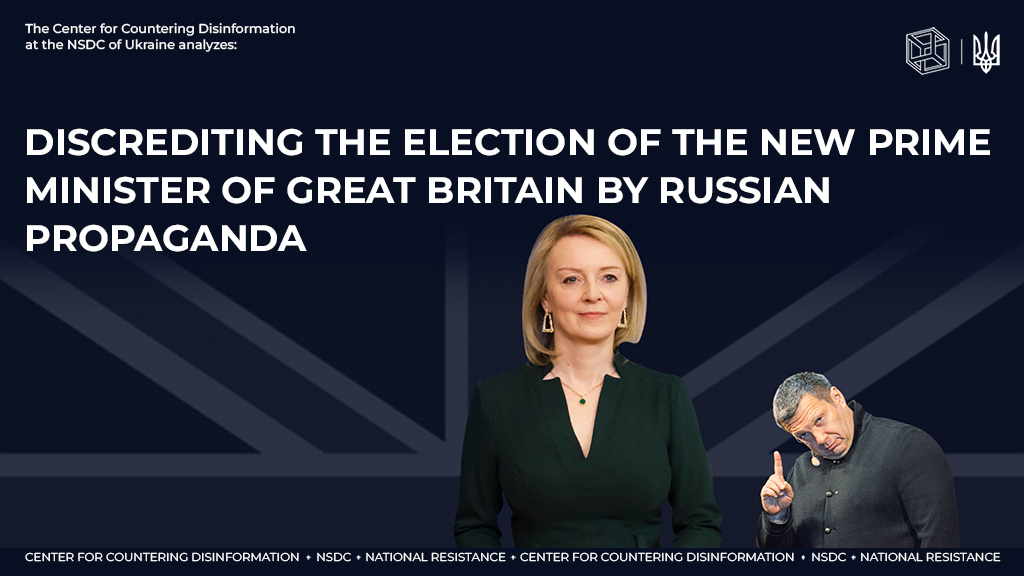The Center for Combating Disinformation at the National Security Council of Ukraine analyzes the discrediting of the election of the new Prime Minister of Great Britain by Russian propaganda. The official reaction of the Kremlin to the victory of Liz Truss:
• D. Peskov: “judging by her statements about Russia, we can expect that positive changes will not take place, because bilateral relations are currently at a level, there is no room for worse.”
• S. Lavrov: “Liz Truss defends the interests of Britain without seeking compromises, which is unlikely to strengthen London’s position in the international arena. It is trying to compensate for Britain’s lost influence in Europe by aggressive actions in the situation around Ukraine.”
Russian propagandists point out the main “shortcomings” of Liz Truss during her year of work in the British Foreign Ministry with the following theses:
• actively publicized anti-Russian rhetoric and implemented the “toughest” anti-Russian sanctions; • under it, Britain became one of the first countries that started supplying weapons to Ukraine and allocated 2.3 billion pounds of aid;
• seeks to continue financial support for Ukraine to “prolong the conflict” against the background of statements that “Russia must lose”;
• demanded not to assume strategic dependence on China, as on Russia; • expressed readiness to use nuclear weapons in case of need;
• will continue the anti-Russian course, but this will not help her solve the problems of the British;
• the style and policy of the British cabinet will be characterized by the continuity of “Russophobia to the last Ukrainian”
Immediately after the announcement of the victory of Liz Truss, the propaganda of the Russian Federation distributed a previously prepared selection of “funny excuses” of the British leader:
• in February 2022, declared the non-recognition of Russia’s sovereignty over the Voronezh and Rostov regions;
• said that Britain provides support to the Baltic allies across the Black Sea;
• called Ukraine a country that was invaded as before – by Mongols and Tatars;
• declared her absolute support for all Britons going to fight in Ukraine, but later denied support for the participation of British troops;
• slandered during the speech that she would “fight for Putin”, but immediately corrected herself;
• declared that it will not provide handouts to the population to help against the background of a record price increase;
• called for the abolition of the royal power in Britain, because no one needs it “at home”.
Manipulations of the results of British sociological studies have gained considerable circulation in the Russian mass media. In particular, propagandists of the Russian Federation assure that “35% of British people believe that Liz Truss will be a “terrible” prime minister, the worst since Margaret Thatcher, even worse than Boris Johnson”, while only 12% expect a good prime minister.
But the cited study found 33% of Tory supporters were “very disappointed” because they voted for another candidate, while 41% of Conservatives were happy with Liz Truss’ victory.
Indeed, against the background of economic challenges, the coronavirus, the war in Ukraine and the Brexit negotiations, the British are skeptical about the ability of the new government to quickly solve the country’s problems. Only 21% of respondents are optimistic about the ability of the Tras administration to solve these problems.
That is why Russian commentators focus on the scale of the “decade-record” prices for electricity and fuel and food products, falling incomes and rising inflation, etc. That is, “mindless sanctioning British policy” has led to rising electricity and heating bills, so the new prime minister will have to say “turn off the lights”.
The propaganda of the Russian Federation is happy that in two years in Britain the average annual electricity bill has increased from 1.3 to 3.6 thousand pounds. But they do not indicate that the average annual salary in Britain is about 30 thousand pounds. On the contrary, it is predicted that in January next year, 42% of all households in Britain will not be able to fully heat their homes, adding to many other “household woes”.
Also, the joy of the Russian reader is fueled by expectations of an economic recession in Britain by the end of the year and the “difficult geopolitical situation due to the confrontation between Russia and the West in Ukraine.” That is why “Russian experts” predict a short term of service for Liz Truss, because “Britain is falling into a crisis, and “one-year” ministers are not able to solve the state’s problems.” Propagandists of the Russian Federation are “worried” that Britain’s financial capabilities in military aid to Ukraine and the availability of free weapons for supply should end by the end of the year. And how, under such conditions, the Trust intends to raise defense spending by the end of the decade to the declared 3% of GDP!
Also, Russian propagandists are outraged by Liz Truss’ promise to make her first phone call as Prime Minister to the President of Ukraine. Memes are circulating that Truss as prime minister can be worse than B. Johnson, who is portrayed as a clown.
She is called “very aggressive and poorly educated, which reflects the general crisis of Britain and its ruling class.” Thus, the coverage of the election of the new Prime Minister of Great Britain in the Russian Federation is dominated by a disparaging intonation with a transition to personal humiliation and an emphasis on the image of the enemy of Russia.










